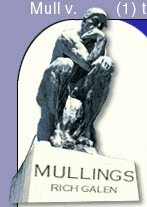


|
|
|
Rich Galen Friday September 1, 2006
ROBERTS: So, will the president be able to make his case that winning the war in Iraq is essential to the battle against terrorism?
Joining me now to talk about that, two people on opposite sides of this debate, Paul Glastris -- he's the editor in chief of "Washington Monthly" -- and Republican strategist Rich Galen, who is the publisher of Mullings.com.
Rich Galen, let's start with you.
We have heard President Bush, for the last couple of years, say that Iraq is the central front in the war on terror. Why is it any different this time around?
RICH GALEN, REPUBLICAN STRATEGIST: Well, don't think it is any different. But I do think -- is that this White House, until recently, with the -- the change-out in -- in press secretaries, from -- to Tony Snow, I don't think has done a very good job in -- in making sure that that message gets out on a regularized basis. And Paul knows this better than the -- the other two of us. I mean, he was a speechwriter for -- for Bill Clinton.
Clinton had a -- an extraordinarily good group of people all the way through his two terms, people like Josh King and Doug Sosnik, communications director, and -- and the speechwriting crew.
So, the -- the White House has an obligation to frame the national debate. And I don't think that this White House, up until the last couple of weeks or so, has done a very good job doing that.
ROBERTS: Right.
Now, the president said earlier today that these speeches were not political in nature. He -- he almost smirked a little bit when he said that.
And let's take a quick listen to what he said today, when he was speaking before a crowd. It was a -- a -- a public event, a political event, for Orrin Hatch. Let's take a listen to what the president said.
(BEGIN VIDEO CLIP)
BUSH: This is the decisive ideological struggle of the 21st century. Some would like to assign this war to something as -- something as simple as law enforcement. That shows a lack of understanding of the nature of the enemy.
You know, the tendency in any difficult situation is for some to want to forget the lessons, put the past behind, and think about a -- a more comforting future. And I can understand that.
(END VIDEO CLIP)
ROBERTS: So, Rich Glastris -- Paul Glastris, I mean -- there was -- there was a remarkable sense of deja vu when I heard those words today, because they sounded almost identical to what the president was saying during the 2004 campaign, when he was trying to paint John Kerry as soft on terror. So, can it be said that these are not political speeches?
PAUL GLASTRIS, EDITOR IN CHIEF, "THE WASHINGTON MONTHLY": No. They're -- they're clearly political speeches. It's a tough political row to hoe.
Rich said that the Clinton White House did a better job than the Bush White House has been doing. But the Clinton White House had a good story, had good facts behind it. The president -- America won the Kosovo war. America, alas, is losing the Iraq war.
So -- so, this is a very uphill battle for -- for the president and his staff. And -- and it's -- I don't -- Rich knows that, in -- in 2004, the president was able to make this argument that the war on terror and the war in Iraq were the same.
ROBERTS: Mmm-hmm.
GLASTRIS: That's no longer the case, that -- the American public has disengaged. The majority of the public now, unlike 2004, does not think that -- that the war in Iraq is part of the war on terror.
GALEN: Well, you know...
GLASTRIS: And they're trying to fuse that.
GALEN: You know, back at this point, Paul, in 1998, I was running a thing called GOPAC, which was Gingrich's PAC. And -- and, coming out of the August election, I can remember that -- that we were rubbing our hands together with glee. Boy, we had you guys on the run. It was going to -- guess what? We lost five seats.
It's a long way to go between now and then, because, when you guys came back after the August break, you got your legs under you, and you -- you -- you took us to the cleaners. So, there's a long way to go, in terms of making -- making these points.
And one of the things the Democrats have not been able to do -- and the time for this, I believe, is short -- is, it's one thing for Ned Lamont and Al Sharpton and -- and MoveOn.org to say, get out of Iraq, get out of Iraq, but -- but somebody has got to say, and then this will happen.
ROBERTS: Well -- well, what...
GALEN: And nobody has -- nobody has been able to really articulate that on the Democratic side.
ROBERTS: Well, what about that, Paul?
Can the Democrats just sit back and -- and -- and watch the -- the Republicans get pummeled over Iraq? Or do they have to articulate an alternative plan before November?
GLASTRIS: I don't think they do, frankly. I wish they would, but I don't think they need to, to win. If this were a presidential election, and you had a visionary leader, who the public was waiting for to provide a strategy for victory, I think that would be true.
But, in a midterm election -- midterm elections, like it or not, are referendums on the politicians in power. All Democrats have to be able to say is, if you like what's happening in Iraq, vote Republican.
ROBERTS: Hey, Rich, Rich, Rich, we're running out of time here, but I wanted to ask you this -- this one question.
Some Republican strategists who I talked to back in the spring, when the president was talking up Iraq, said, you know, it's already too late. We believe that people have -- have made up their minds. Is anybody listening to the president anymore?
GALEN: Well, they will, as we get closer to the election� Most people, unlike folks watching us tonight and people like us, who -- who -- who watch us very closely, the -- the huge majority of the voting public will begin to tune in starting some time in the next few weeks. That's why we say right after Labor Day begins the campaign season.
ROBERTS: All right. Well, we will see if it's effective.
Rich Galen, Paul Glastris, thanks for being with us. Appreciate it.
GALEN: Nice to be with you.
GLASTRIS: Thank you. Actual Caption:
()
Copyright �2006 Richard A. Galen | Site design by Campaign Solutions. |


